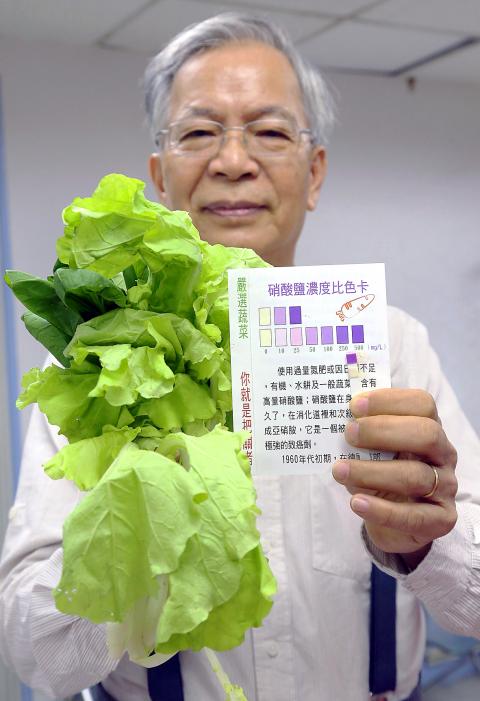The Homemakers United Foundation and the Consumers’ Foundation yesterday urged safety standards to measure levels of nitrates in vegetables and to have the checks listed as a regular item of inspection.
A few months ago, a 42-year-old woman who was a long-term vegetarian was diagnosed as suffering from acute methemoglobinemia, a form of poisoning, with medics saying she was eating vegetables that contained high levels of nitrate, the Consumers Foundation said.
Some farmers apply nitrogen fertilizer to grow vegetables faster, but when the fertilizers used are exposed to insufficient levels of sunlight, crops have difficulty performing photosynthesis and excessive levels of nitrate can accumulate in the plants, the foundation said, adding that the intake of high levels of nitrate can lead to poisoning.

Photo: CNA
Homemakers United Foundation president Chen Man-li (陳曼麗) said the EU has established safety standard levels of nitrate in spinach and lettuce, according to the difference in daylight hours during winter and summer, and so the Council of Agriculture in Taiwan should follow the example and set safety levels to protect consumers.
Consumers’ Foundation committee member and retired professor at the National Taiwan University’s Horticulture Department Cheng Cheng-yung (鄭正勇) said nitrogenous fertilizers — whether artificial or organic — can add excessive amounts of nitrate to vegetables due to insufficient light.
Long-term intake of excessive nitrates can cause negative health effects, Cheng said, adding that cooking vegetables in boiled water for two minutes can lower nitrate levels by between 20 percent to 50 percent.
Although several countries — including the US, Japan, Canada and Australia — have not set safety levels for nitrates in vegetables, the foundation urged the government to list nitrate testing as a regular item for inspection.

Alain Robert, known as the "French Spider-Man," praised Alex Honnold as exceptionally well-prepared after the US climber completed a free solo ascent of Taipei 101 yesterday. Robert said Honnold's ascent of the 508m-tall skyscraper in just more than one-and-a-half hours without using safety ropes or equipment was a remarkable achievement. "This is my life," he said in an interview conducted in French, adding that he liked the feeling of being "on the edge of danger." The 63-year-old Frenchman climbed Taipei 101 using ropes in December 2004, taking about four hours to reach the top. On a one-to-10 scale of difficulty, Robert said Taipei 101

A preclearance service to facilitate entry for people traveling to select airports in Japan would be available from Thursday next week to Feb. 25 at Taiwan Taoyuan International Airport, Taoyuan International Airport Corp (TIAC) said on Tuesday. The service was first made available to Taiwanese travelers throughout the winter vacation of 2024 and during the Lunar New Year holiday. In addition to flights to the Japanese cities of Hakodate, Asahikawa, Akita, Sendai, Niigata, Okayama, Takamatsu, Kumamoto and Kagoshima, the service would be available to travelers to Kobe and Oita. The service can be accessed by passengers of 15 flight routes operated by

Taiwanese and US defense groups are collaborating to introduce deployable, semi-autonomous manufacturing systems for drones and components in a boost to the nation’s supply chain resilience. Taiwan’s G-Tech Optroelectronics Corp subsidiary GTOC and the US’ Aerkomm Inc on Friday announced an agreement with fellow US-based Firestorm Lab to adopt the latter’s xCell, a technology featuring 3D printers fitted in 6.1m container units. The systems enable aerial platforms and parts to be produced in high volumes from dispersed nodes capable of rapid redeployment, to minimize the risk of enemy strikes and to meet field requirements, they said. Firestorm chief technology officer Ian Muceus said

MORE FALL: An investigation into one of Xi’s key cronies, part of a broader ‘anti-corruption’ drive, indicates that he might have a deep distrust in the military, an expert said China’s latest military purge underscores systemic risks in its shift from collective leadership to sole rule under Chinese President Xi Jinping (習近平), and could disrupt its chain of command and military capabilities, a national security official said yesterday. If decisionmaking within the Chinese Communist Party has become “irrational” under one-man rule, the Taiwan Strait and the regional situation must be approached with extreme caution, given unforeseen risks, they added. The anonymous official made the remarks as China’s Central Military Commission Vice Chairman Zhang Youxia (張又俠) and Joint Staff Department Chief of Staff Liu Zhenli (劉振立) were reportedly being investigated for suspected “serious